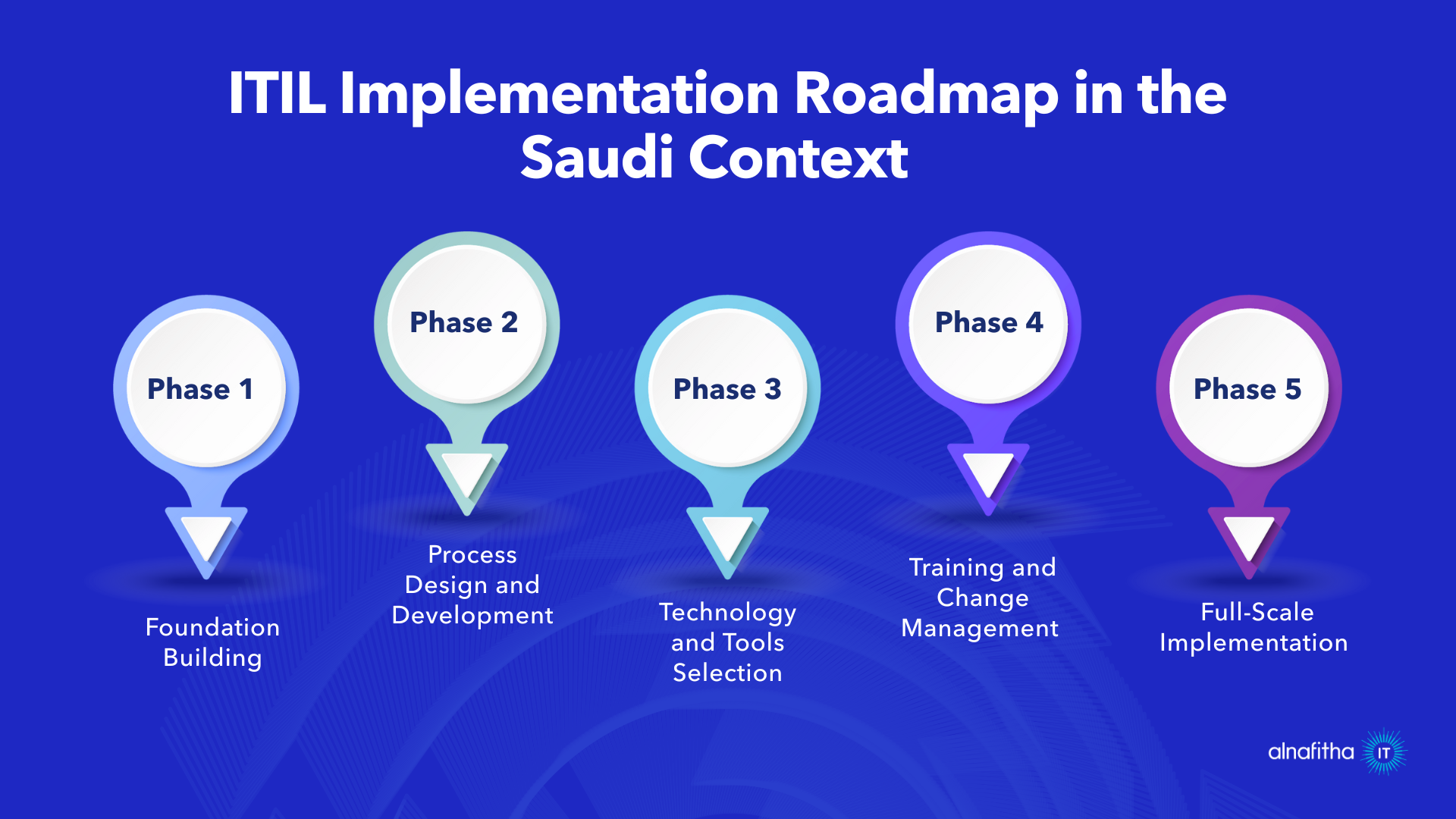Introduction: Why Your ITIL Implementation Roadmap is Critical for Saudi Business Success
Creating a full-scale ITIL Implementation Roadmap has become essential for Saudi organizations seeking operational excellence in the digital age. As Vision 2030 accelerates technological transformation across the Kingdom, businesses need a structured ITIL Implementation Roadmap that considers local market dynamics while delivering international-standard results.
This guide provides a detailed ITIL Implementation Roadmap specifically designed for Saudi organizations, addressing cultural considerations, regulatory requirements, and market-specific challenges that make implementation in the Kingdom unique.
Understanding Your ITIL Implementation Roadmap in the Saudi Context
What Makes a Saudi ITIL Implementation Roadmap Different?
Your ITIL Implementation Roadmap in Saudi Arabia must balance global best practices with local business culture and regulatory requirements. Unlike generic international roadmaps, a successful ITIL Implementation Roadmap for Saudi organizations requires:
- Cultural sensitivity and respect for hierarchical structures
- Integration with traditional Saudi business practices
- Compliance with local regulations and standards
- Bilingual documentation and training approaches
- Adaptation to local market dynamics
For more insights on Saudi technology trends that impact your ITIL Implementation Roadmap, explore our Saudi Technology Transformation Guide.

Phase 1 of Your ITIL Implementation Roadmap: Foundation Building
Months 1-3: Establishing Your ITIL Implementation Roadmap Foundation
The first phase of your ITIL Implementation Roadmap focuses on building solid foundations within the Saudi business environment.
Key Foundation Activities:
- Leadership Alignment: Secure visible commitment from senior management for your ITIL Implementation Roadmap
- Cultural Assessment: Understand your organization’s cultural readiness for change
- Current State Analysis: Evaluate existing IT service management practices
- Regulatory Review: Align your ITIL Implementation Roadmap with Saudi compliance requirements
Building Stakeholder Support for Your ITIL Implementation Roadmap
In Saudi business culture, relationship-building is crucial for any successful ITIL Implementation Roadmap. Focus on:
- Engaging with key decision-makers early in your planning process
- Creating consensus around your ITIL Implementation Roadmap objectives
- Addressing cultural concerns and traditional business practices
- Establishing clear communication channels for ongoing updates
Phase 2 of Your ITIL Implementation Roadmap: Process Design and Development
Months 4-8: Designing Your Saudi-Specific ITIL Implementation Roadmap
The second phase of your ITIL Implementation Roadmap involves adapting ITIL processes for the Saudi business environment.
Core Design Activities:
- Process Customization: Adapt ITIL processes to fit Saudi organizational structures
- Technology Selection: Choose tools that support your ITIL Implementation Roadmap goals
- Training Development: Create culturally appropriate learning materials
- Pilot Planning: Design pilot projects that demonstrate quick wins
Cultural Considerations in Your ITIL Implementation Roadmap
Your ITIL Implementation Roadmap must address specific Saudi cultural factors:
Hierarchical Respect: Design processes that work within existing authority structures while promoting ITIL best practices
Consensus Building: Include collaborative decision-making approaches in your ITIL Implementation Roadmap
Religious Observance: Schedule activities around prayer times and religious holidays
Language Requirements: Ensure your ITIL Implementation Roadmap includes both Arabic and English materials
Phase 3 of Your ITIL Implementation Roadmap: Technology and Tools Selection
Choosing the Right Technology for Your ITIL Implementation Roadmap
Technology selection is a critical component of any successful ITIL Implementation Roadmap. For Saudi organizations, consider:
Local Compliance Features: Ensure tools support Saudi data protection and regulatory requirements
Arabic Language Support: Select platforms that offer integrated Arabic interfaces
Integration Capabilities: Choose solutions that work with existing Saudi business systems
Scalability Options: Plan for growth as your ITIL Implementation Roadmap matures
Cloud vs. On-Premises Decisions in Your ITIL Implementation Roadmap
Your ITIL Implementation Roadmap technology decisions must consider:
- Data sovereignty requirements in Saudi Arabia
- Local internet infrastructure capabilities
- Regulatory compliance needs
- Cost optimization opportunities
- Local vendor support availability
Phase 4 of Your ITIL Implementation Roadmap: Training and Change Management
Building Change Readiness in Your ITIL Implementation Roadmap
Successful change management is essential for any ITIL Implementation Roadmap in Saudi Arabia. Key strategies include:
Leadership Modeling: Ensure senior management visibly supports your ITIL Implementation Roadmap
Gradual Introduction: Implement changes gradually to respect cultural preferences for stability
Personal Relationships: Leverage existing relationships to support ITIL Implementation Roadmap adoption
Success Stories: Share local success stories that demonstrate ITIL Implementation Roadmap benefits
Training Strategies for Your ITIL Implementation Roadmap
Effective training is crucial for ITIL Implementation Roadmap success. Design programs that:
- Use Saudi business case studies and examples
- Provide materials in both Arabic and English
- Respect cultural learning preferences
- Include ongoing mentoring and support
- Align with religious and cultural observances
Phase 5 of Your ITIL Implementation Roadmap: Full-Scale Implementation
Months 9-18: Executing Your ITIL Implementation Roadmap
The implementation phase of your ITIL Implementation Roadmap requires careful coordination and cultural sensitivity.
Implementation Priorities:
- Service Desk Excellence: Start with highly visible improvements
- Incident Management: Focus on quick resolution and customer satisfaction
- Change Management: Implement controlled change processes
- Problem Management: Address root causes systematically
Managing Resistance in Your ITIL Implementation Roadmap
Your ITIL Implementation Roadmap may encounter resistance. Address concerns by:
- Acknowledging cultural values and traditional practices
- Demonstrating clear benefits and quick wins
- Providing adequate training and support
- Maintaining open communication channels
- Celebrating successes along the way
Success Metrics for Your ITIL Implementation Roadmap
Measuring ITIL Implementation Roadmap Success in Saudi Arabia
Your ITIL Implementation Roadmap should include both international standards and Saudi-specific success indicators.
Operational Excellence Metrics:
- Service availability improvements (target: 99.5%+ uptime)
- Incident resolution time reductions (target: 30-50% improvement)
- Change success rates (target: 95%+ successful changes)
- Customer satisfaction scores (target: 4.5+ on 5-point scale)
Cultural Integration Metrics:
- Employee adoption rates across different organizational levels
- Training completion and certification achievements
- Cross-departmental collaboration improvements
- Leadership satisfaction with ITIL Implementation Roadmap progress
Continuous Improvement in Your ITIL Implementation Roadmap
Build continuous improvement into your ITIL Implementation Roadmap through:
- Regular Assessments: Quarterly maturity evaluations
- Feedback Collection: Ongoing stakeholder input gathering
- Process Refinement: Continuous optimization based on results
- Best Practice Sharing: Knowledge sharing across the organization
Regulatory Compliance in Your ITIL Implementation Roadmap
Aligning Your ITIL Implementation Roadmap with Saudi Regulations
Your ITIL Implementation Roadmap must address key Saudi regulatory requirements:
Saudi Data and AI Authority (SDAIA): Ensure data governance processes align with SDAIA guidelines
Financial Sector Compliance: For banks and financial institutions, integrate SAMA requirements into your ITIL Implementation Roadmap
Government Standards: Public sector organizations must align their ITIL Implementation Roadmap with government digital transformation initiatives
Cybersecurity Requirements: Incorporate National Cybersecurity Authority guidelines
For detailed compliance guidance, consult the Saudi Digital Government Authority and Communications, Space & Technology Commission.
Common Challenges in Your ITIL Implementation Roadmap
Overcoming ITIL Implementation Roadmap Obstacles
Saudi organizations commonly face these ITIL Implementation Roadmap challenges:
Skills Gap: Limited local ITIL expertise requiring comprehensive training programs
Cultural Resistance: Traditional business practices conflicting with ITIL approaches
Technology Integration: Legacy systems requiring careful integration planning
Resource Constraints: Budget and staffing limitations affecting ITIL Implementation Roadmap scope
Solutions for ITIL Implementation Roadmap Success
Address these challenges by:
- Partnering with local universities for talent development
- Engaging experienced consultants for knowledge transfer
- Implementing phased approaches to manage complexity
- Building strong business cases for resource allocation
Saudi Success Stories: ITIL Implementation Roadmap Case Studies
King Abdullah Financial District (KAFD) ITIL Implementation Roadmap Success
KAFD-DMC’s transformational ITIL Implementation Roadmap exemplifies how major Saudi organizations can achieve enterprise-grade service management excellence. Partnering with Alnafitha Information Technology as their ManageEngine Platinum Partner, KAFD successfully implemented a comprehensive service management transformation.
Key Challenges Addressed:
- Absence of standardized service request workflows causing inconsistent user experiences
- Limited visibility into ticket status and resolution times
- Difficulties meeting Service Level Agreements and tracking performance
- Compliance risks due to insufficient endpoint visibility
- Lack of formalized testing and validation processes
ITIL Implementation Roadmap Results with Alnafitha:
- Process Standardization: Implementation of standardized service request workflows ensuring consistent user experiences
- Performance Enhancement: SLA configuration and dashboard setup for improved operational visibility
- Asset Management Excellence: Enhanced IT Asset Management with better utilization tracking and license compliance
- Security Integration: AD360 deployment for strengthened security management and compliance frameworks
- Endpoint Visibility: Comprehensive endpoint management through Endpoint Central addressing compliance risks
Business Impact Achieved:
- Integrated system health improvements across enterprise infrastructure
- Enhanced monitoring capabilities through advanced SLA and dashboard configurations
- Improved ticket resolution transparency and technician accountability
- Strengthened asset depreciation tracking for better financial management
Future Trends Affecting Your ITIL Implementation Roadmap
Emerging Technologies Impact
The future of your ITIL Implementation Roadmap will be influenced by:
Artificial Intelligence: Automated incident detection and resolution capabilities
Cloud Computing: Hybrid and multi-cloud service management requirements
Mobile Technology: Mobile-first service delivery approaches
IoT Integration: Internet of Things device management considerations
Advanced Analytics: Predictive service management capabilities
Vision 2030 Impact on Your ITIL Implementation Roadmap
Saudi Arabia’s Vision 2030 creates opportunities for your ITIL Implementation Roadmap:
- Digital government initiatives requiring improved IT service delivery
- Economic diversification creating new technology demands
- Smart city projects needing robust IT service management
- Innovation hub development requiring world-class IT operations
Getting Professional Support for Your ITIL Implementation Roadmap
Choosing ITIL Implementation Roadmap Partners
Select partners who understand both ITIL best practices and Saudi business culture. Look for:
- Local market experience and cultural sensitivity
- Proven ITIL Implementation Roadmap expertise
- Arabic language capabilities
- Understanding of Saudi regulatory requirements
- Strong references from similar organizations
Your Next Steps: Launching Your ITIL Implementation Roadmap
Immediate Actions for ITIL Implementation Roadmap Success
- Executive Sponsorship: Secure visible leadership commitment for your ITIL Implementation Roadmap
- Team Assembly: Build a cross-functional team with cultural and technical expertise
- Initial Assessment: Evaluate current IT service management maturity
- Quick Wins Identification: Select initial projects that demonstrate value
- Cultural Preparation: Develop change management strategies appropriate for Saudi culture
Long-Term ITIL Implementation Roadmap Planning
Your ITIL Implementation Roadmap should include:
- Three-year maturity progression goals
- Continuous improvement mechanisms
- Technology upgrade pathways
- Skills development programs
- Cultural integration milestones
Conclusion: Your Path to ITIL Implementation Roadmap Success
A well-designed ITIL Implementation Roadmap tailored for Saudi organizations can deliver significant business value while respecting cultural values and local market requirements. Success requires patience, cultural sensitivity, and unwavering commitment to both ITIL excellence and Saudi business traditions.
By following the strategies outlined in this guide, your organization can create and execute an ITIL Implementation Roadmap that achieves operational excellence, enhances customer satisfaction, and supports Saudi Arabia’s digital transformation goals.
The journey requires dedication, but the rewards of a successful ITIL Implementation Roadmap are substantial. Start your planning today and join the growing community of Saudi organizations achieving world-class IT service management through structured ITIL implementation.
Need to develop your ITIL Implementation Roadmap? Contact our Saudi-based experts today for personalized guidance and support tailored to your organization’s unique needs and cultural conte
